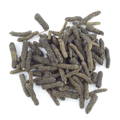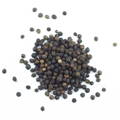Long Pepper vs. Black Pepper
Long pepper and black pepper are close relatives. They both belong to the Piperacaea family and they have similarities in flavor. Both have been used for 1000s of years in Ayurvedic medicine and are thought to have healing properties. The overriding spicy "pepper" flavor is due to the alkaloid piperine compounds they share. But let's discuss what makes each of them unique! And just like salt, pepper helps food bring out their bolder flavors.
Fun Fact: At the height in value, peppercorns worth worth their weight in gold.
Long Pepper (Piper longum)
Long pepper shares the same genus (Piper), but is a different species (longum) from black pepper. It's easy to see why by looking at it's fun shape! The fruit of the long pepper is actually a collection of minuscule fruits, embedded in the surface of a flower spike.
The flavor of long pepper is described as hotter and sweeter with earthy notes of clove and nutmeg. If you don't have long pepper, you can substitute Telicherry black pepper or even grains of paradise!
While black peppercorns can be found in virtually every grocery store on the planet, long pepper will be available at an Indian grocery store or boutique online shops!
Tip: It's often suggested that long pepper will clog up a pepper mill, and it's recommended to use a mortar & pestle. In our experience, long pepper is very hard and has to be pounded forever in a mortar and pestle. But the pepper mill works great.
Black Pepper (Piper nigrum)
Black pepper is the 2nd most popular seasoning behind salt!
The best world to describe black pepper is pungent! When you get a big bite of a coarse cracked peppercorn, it feels as if it goes straight up your nose. The black peppercorn is responsible for white and green peppercorns, too—they have been harvested at different times and preserved with different methods, adding complexities to their flavor.
It is essential to grind pepper fresh when you use it! The flavor profile begins to break down as soon as it's ground; there is a reason that all recipes call for, "fresh pepper."






